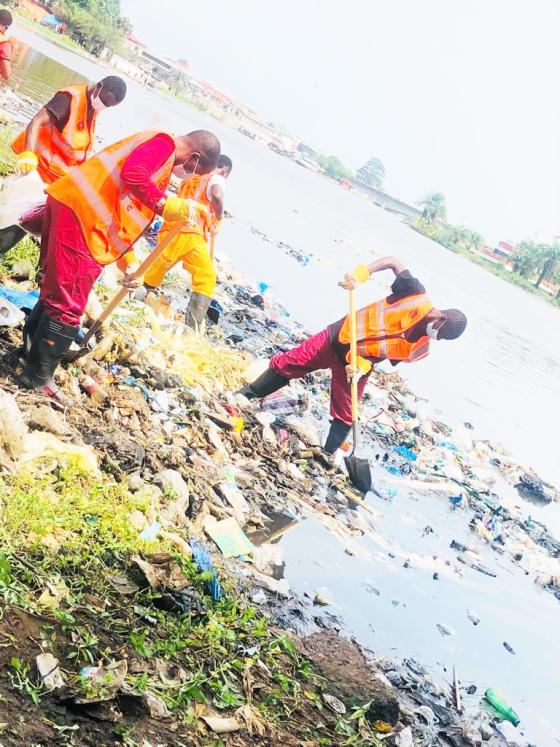Liberia: World Wetlands Day: Time to Connect the Dots, Protect and Restore our Wetlands

By Moses Massah, UNDP’s Energy and Environment Programme Manager
Monrovia, Liberia; February 1, 2023: Driving through Monrovia and other urban centers, you see rivers and swamps choking under solid waste and suffocating under plastics. The country’s water bodies are slowly and surely being converted into toxic death traps for fish and other living creatures instead of being nurtured for refreshing waters and abundant healthy fish stocks. While the solid wastes directly pollute the waters, the floating plastics cut off oxygen supply such that the country’s wetlands could soon be unable to support any form of life.
Swamps, especially in Monrovia, are rapidly being filled to make way for the construction of homes and business centers, without any regard to the fact that these very wetlands are important for soaking up flood waters during the rains.
In coastal counties, fishing communities unsustainably cut down mangrove forests for firewood to dry their fish. This harvest of mangroves destroys the very future of Liberia’s fisheries – the breeding sites for fish, which is Liberia’s top source of protein and important source of livelihood for hundreds of thousands of fisherfolk around the country. Cutting down mangroves for firewood reduces the country’s daily fish catch, thus driving communities dependent on fishing into poverty.
Some fisherfolk are using dynamite and other chemicals in a bid to maximize their fish catch. However, what they are doing is destroying an entire generation of fish, the adult stock, fingerlings and fish eggs, all in one blast. Some rural communities are doing the same thing using toxic plant species such as Dahoma (Piptadeniastrum africanum) in pursuit of large fish landings.
The long-term effect of destroying the entire fisheries in many of the country’s rivers and creeks using such means, is the systematic and deliberate destruction of the country’s food security. It is also destroying a key source of income for many people and an important source of national revenue, were the country’s fisheries sector properly harnessed.
Therefore, the World Wetlands Day, observed every year on February 2, is so important for raising awareness on the importance of wetlands, and the values, benefits and services they provide to us, humanity. While they may seem to be “idle” or “limitless”, these resources vital to our survival are under serious threat. There is a need to promote conservation and reconsider how we are (mis)using them.
Wetlands include swamps and inland water bodies such as rivers and lakes. According to the United Nations Environment Programme, nearly 90% of the world’s wetlands have been degraded since the 1700s, and 35% of them disappeared in just the last 50 years. It is said we are also losing wetlands three times faster than forests.
Recognizing the threats they face, world governments in 1971, in the Iranian city of Ramsar, put together and signed a convention on wetlands conservation – the Ramsar Convention, which calls on everyone to take good care of the wetlands. Liberia is a party to that Convention.
Wetlands are home to different plants and animals that can be used for food (e.g., fish), medicines, and fuel wood. These different plants and animals are sources of income for many people who live in coastal areas as well as around lakes and rivers, both in urban and rural areas.
Wetlands contribute to the national economy in Liberia in many ways. For example, mangrove wetlands are good breeding grounds for many fishes and other water creatures that account for Liberia’s fisheries sector. Wetlands also serve as nature’s own water filtration system providing clean water to communities countrywide. They also act as water reservoirs buffering against flooding.
When well-managed, wetlands attract diverse life forms including birds and wildlife and can serve as tourism magnets that can put money into the pockets of communities and individuals who care for them. And because most wetland plants are all year-round evergreens, they are important carbon sinks helping moderate climate change.
Liberia has many wetlands but only five have so far been recognized and designated as wetlands of international importance, or Ramsar Sites, and are managed according to international best practice. These are the Montserrado Wetlands, Lake Piso Wetlands, Marshall Wetlands, Kpatawee Wetlands, and the Gbedein Wetlands.
The rest of the country’s wetlands are poorly managed requiring individual and national consciousness and choices to stop their further degradation, followed by proactive restoration and protection to safeguard the many services they are rendering to the present and future generations.
What do we need to do as a country?
There is a need to strengthen and enforce the national policy and legal framework for sustainable wetlands management. This will require establishment of frameworks for integration and engagement of local communities, civil society, and the private sector, notably industries, in planning and implementation of wetlands conservation and restoration programs.
Such programmes should include and engage communities and industries for practical clean-up of degraded wetlands as has been successfully demonstrated by the EPA-UNDP Eco-Brigade programme in Robertsport, Grand Cape Mount County. The Eco-Brigade programme trains the youth to start-up green businesses such as lake or beach clean-up and garbage disposal services, and ecotourism activities. Last year the initiative was scaled up to Grand Bassa and Sinoe Counties.
Finally, there is a need to raise national awareness to change behavior of both companies and individuals whose actions lead to the damage and destruction of the country’s important wetlands.
